In this eight-lecture course, Professor Stephen Hicks guides us through the Enlightenment and the Counter-Enlightenment, including philosophers Francis Bacon, René Descartes, John Locke, Voltaire, David Hume, Jean-Jacques Rousseau, Immanuel Kant, Georg Hegel, Karl Marx, John Stuart Mill, and Friedrich Nietzsche. For each, Dr. Hicks establishes the philosopher’s context, presents his or her most influential arguments, and quotes directly from the philosopher’s important works.
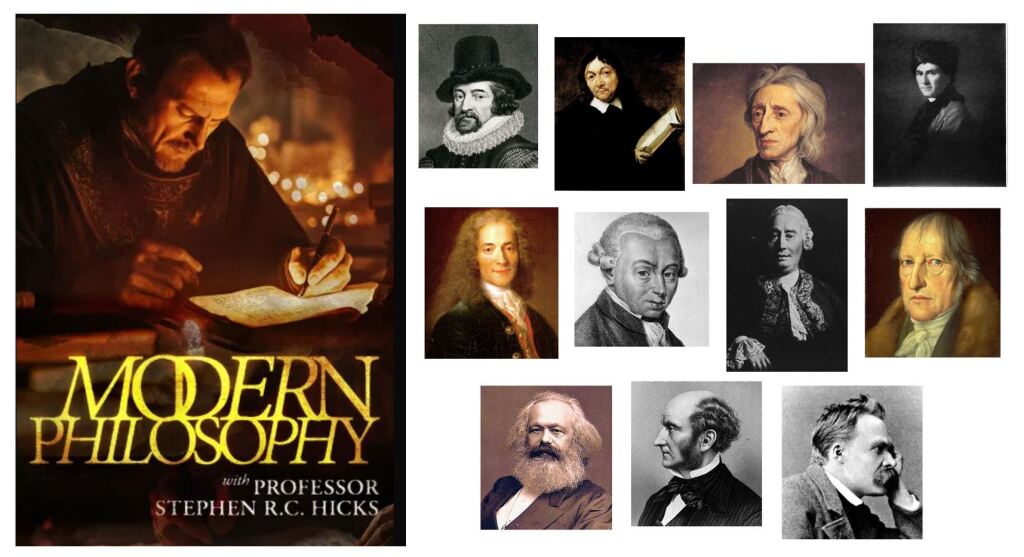
Lecture One: The Birth of the Modern. Francis Bacon
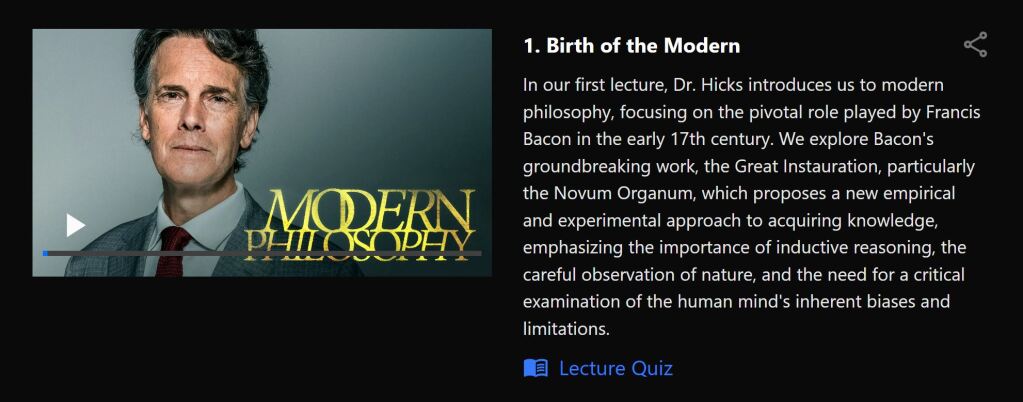
Themes: What is the Modern? 1500: Art. Science. Exploration. Religion. Economy. Politics. Individualism of independent thinking, Individualism of identity, and Individualism of worth. Galileo. Milton. Descartes. Empiricism. Experimentalism. Text: Bacon: The Great Instauration, esp. Novum Organon.
Lecture Two: Radical Doubt. René Descartes
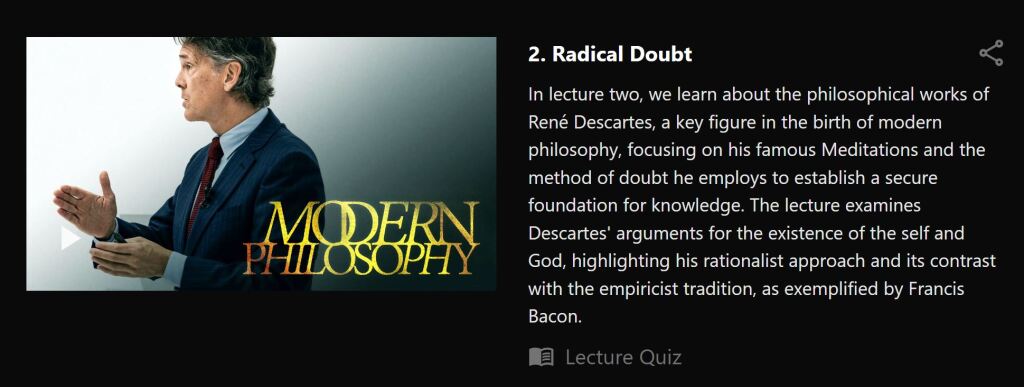
Themes: What can I doubt? Rationalism. Unintended Skepticism? God? External world? Dualism. Vesalius. Hobbes. Copernicus. Galileo. Pope Urban VIII. Text: Descartes: Meditations on First Philosophy.
Lecture Three: The Promise of Individual Empiricism. John Locke
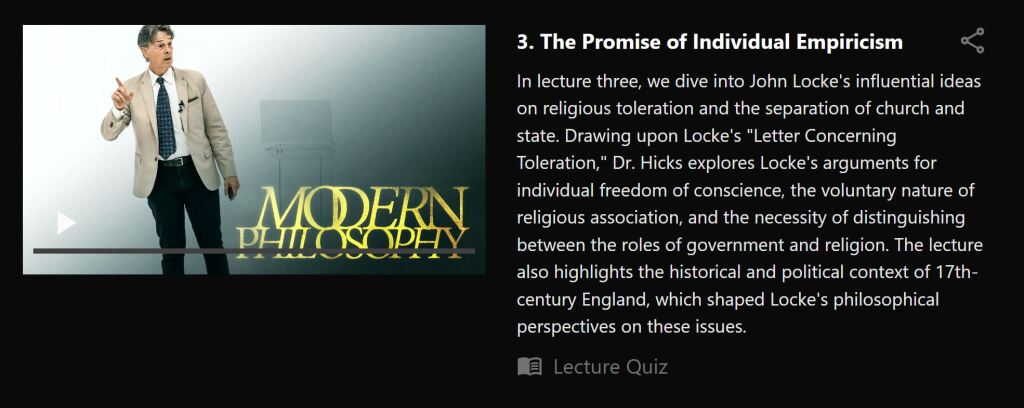
Themes: Empiricism. Tabula rasa. Individualism. Liberalism. Toleration. Church and State. Henry VIII. Shakespeare. Galileo. Descartes. Milton. Cromwell. Newton. Texts: Locke: Enquiry concerning Human Understanding, Two Treatises of Government, A Letter concerning Toleration.
Lecture Four: The Philosophes and the French Enlightenment. Voltaire
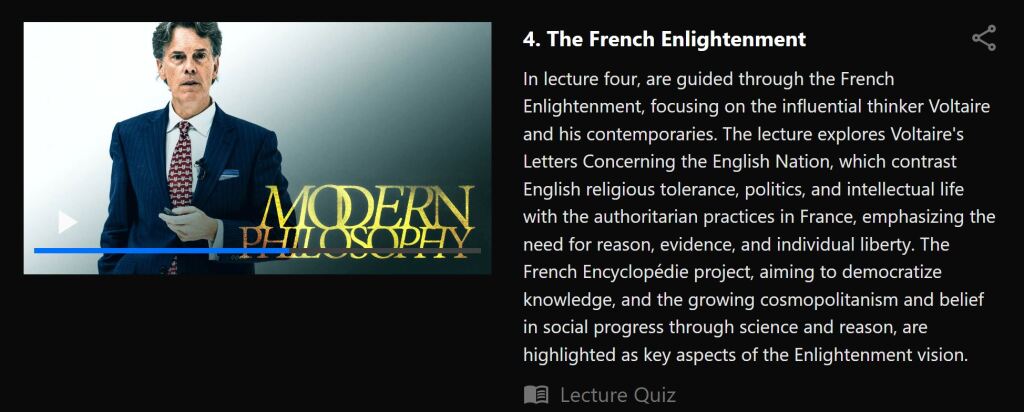
Themes: Deism. Toleration. Anti-superstition. Anti-torture. Irreverence. Who are the greatest humans ever? Augustine. Montaigne. Montesquieu. Diderot. de Gouges. Condorcet. The new “trinity”: Bacon, Locke, Newton. Text: Voltaire: Letters on England.
Lecture Five: Counter-Enlightenment. David Hume and Jean-Jacques Rousseau
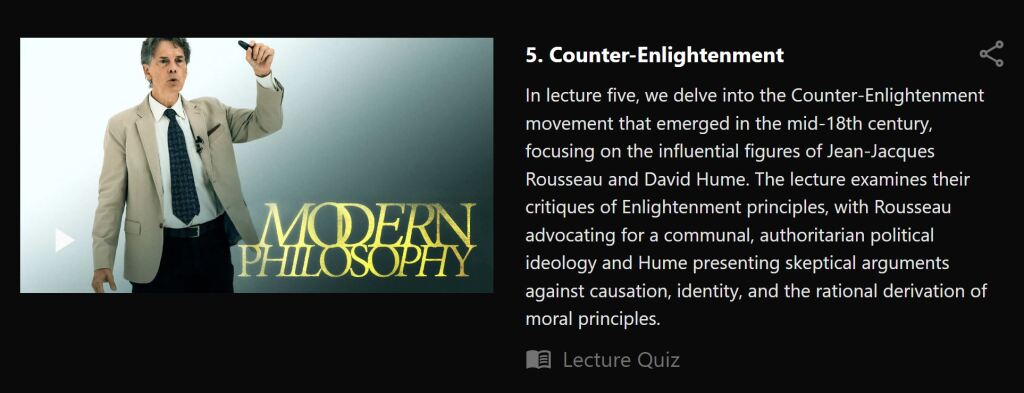
Themes: Skepticism, Passions, Fideism. Critiquing the Enlightenment. French Revolution. Lafayette. Voltaire. de Gouges. Robespierre. Texts: Hume: A Treatise on Human Nature. Rousseau: Discourse on Inequality.
Lecture Six: Awakening from the Dogmatic Slumber. Immanuel Kant
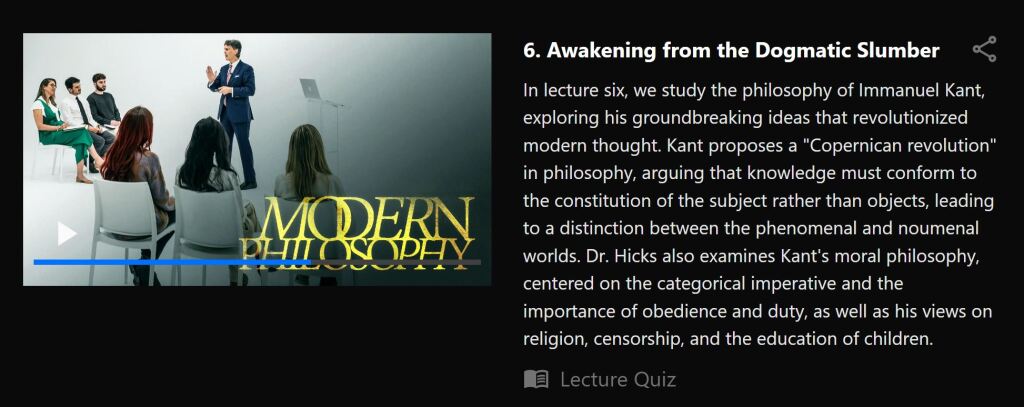
Themes: The sorry fate of metaphysics. Limits to reason. Phenomenal versus Noumenal realities. Duty ethics. Hume. Rousseau. King Frederick William II. Locke. Sulzer. Texts: Kant: Critique of Pure Reason. Groundwork of the Metaphysics of Morals.
Lecture Seven: Resurgent Collectivism. Georg Hegel and Karl Marx
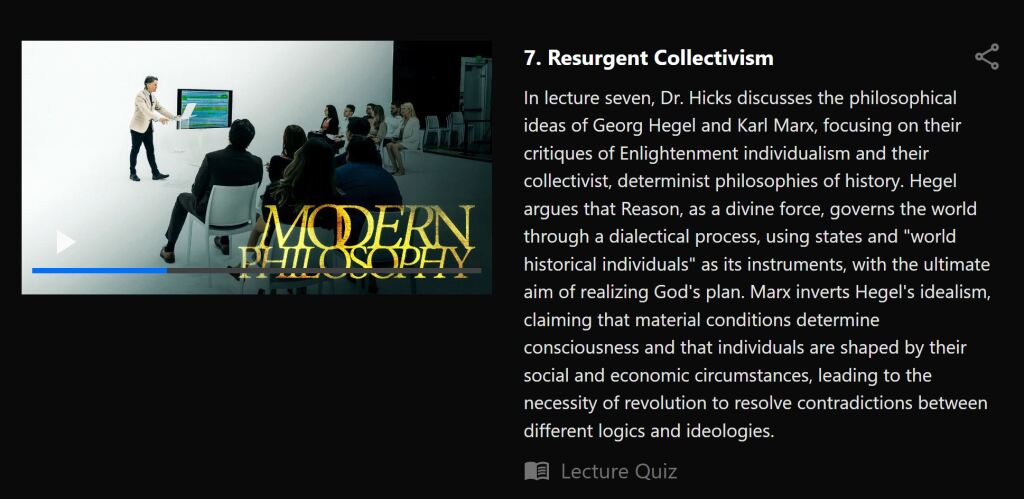
Themes: After Kant, reality or reason? Theodicy. Collectivizing the self. Dialectic and the march of history. Napoleon. Goethe. Keats. Texts: Hegel: Philosophy of History. Marx: Economic and Philosophical Manuscripts, The Communist Manifesto.
Lecture Eight: Liberal or Anti-Liberal? John Stuart Mill and Friedrich Nietzsche
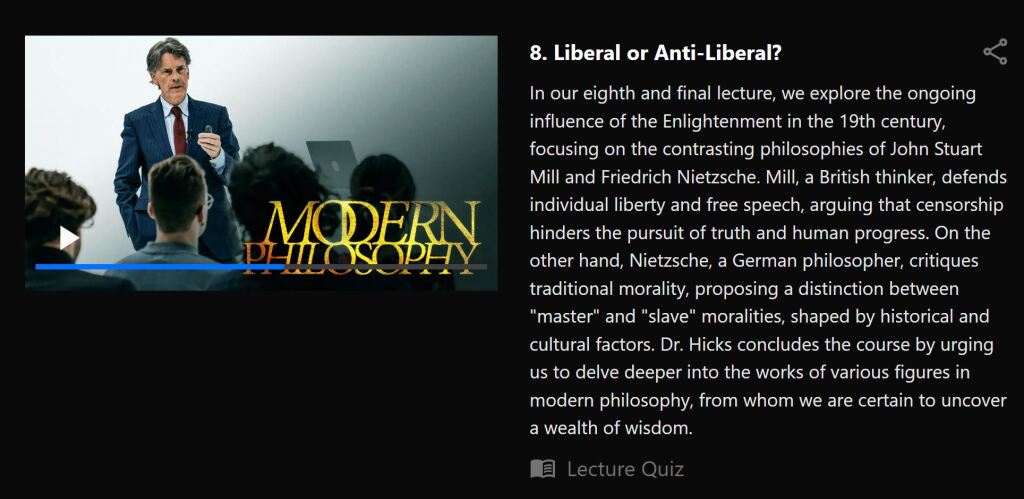
Themes: Darwinism. Utilitarianism versus Expressive Power. Liberty versus Slavery. Social philosophy as derived from basic philosophy. Continuing or rejecting the Enlightenment? Pasteur. Darwin. “Caesars with the soul of Christ.” Texts: Mill: On Liberty, Utilitarianism. Nietzsche: Genealogy of Morals.
About the Instructor
Stephen R. C. Hicks, Ph.D., has been Professor of Philosophy at Rockford University, Illinois; Visiting Professor of Business Ethics at Georgetown University, Washington, D.C.; Visiting Professor at the University of Kasimir the Great, Poland; Visiting Fellow at Harris Manchester College of Oxford University; and Visiting Professor at the Jagiellonian University, Poland.
In 2010, he won his university’s Excellence in Teaching Award.
Dr. Hicks is author of Explaining Postmodernism: Skepticism and Socialism from Rousseau to Foucault, Nietzsche and the Nazis, Entrepreneurial Living, Liberalism Pro and Con, and Eight Philosophies of Education. He has published in Business Ethics Quarterly, Review of Metaphysics, and The Wall Street Journal. His writings have been translated into twenty languages.
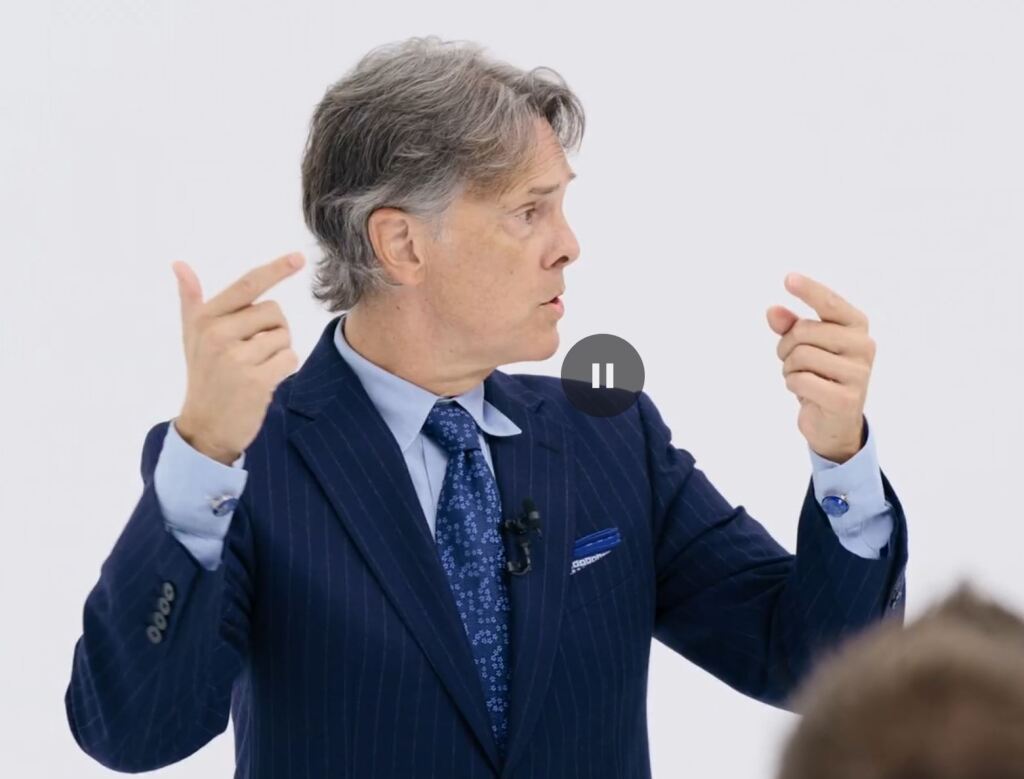
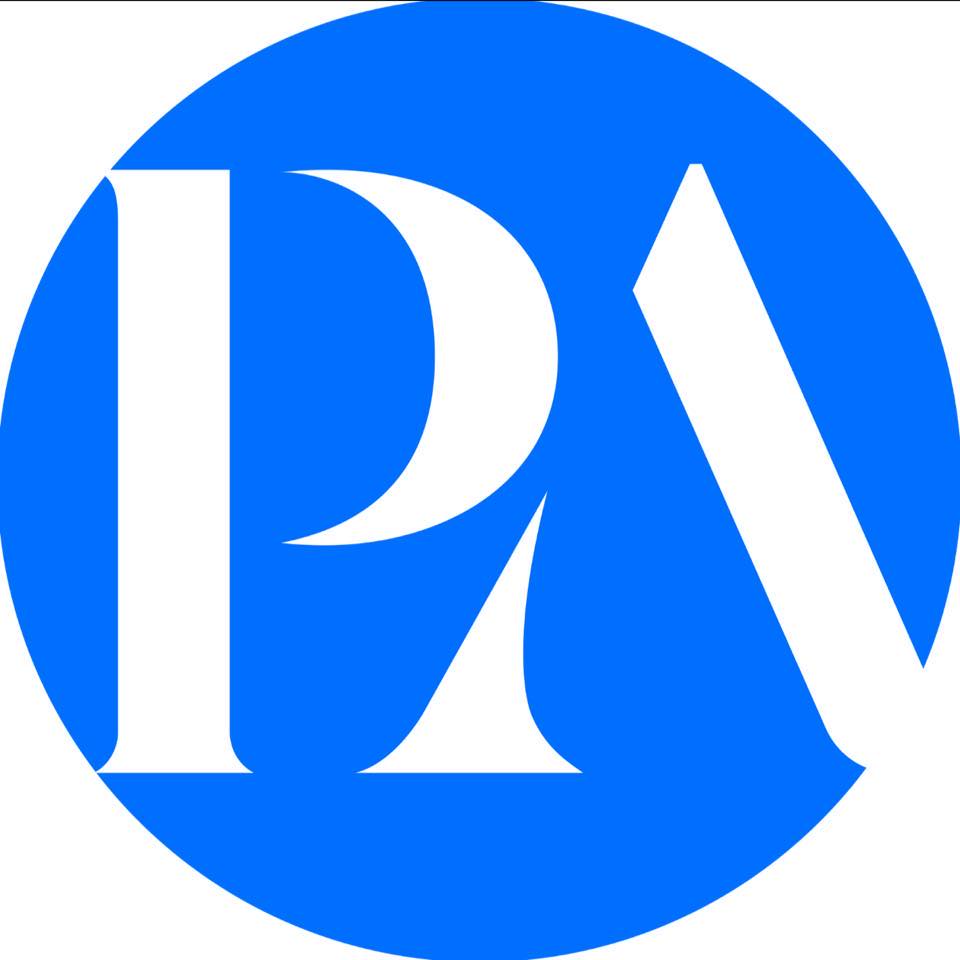
Course trailer and enrollment options at the Peterson Academy site. Professor Hicks’s other courses — Postmodern Philosophy, Philosophy of Politics: From the French Revolution to World War II, Philosophy of Politics: From the Cold War to After 9/11, and Modern Ethics — are coming soon to Peterson Academy.